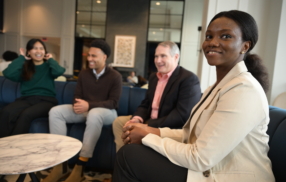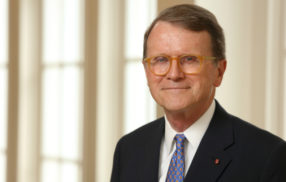
UVA Darden’s Bob Bruner Recommends Books to Make Meaning of Coronavirus Crisis
By Jay Hodgkins
Bob Bruner, dean emeritus of the Darden School of Business and one of only a select few faculty members to hold the prestigious title of University Professor at the University of Virginia, is an expert in financial crises and panics. He is also an avid reader from whom many students and peers seek advice on what to read — providing an annual list of recommended readings on his blog for over a decade, as just one example.
But amid the growing coronavirus pandemic and resulting economic crisis, he’s fielded an increased number of requests about what to read that is relevant to the present moment. He responded with a list of four kinds of books that could help readers make meaning of the current crisis.
Read Bruner’s post below, republished from his blog in its entirety. Read and subscribe to the Robert F. Bruner blog for more insights from Bruner.
One of the more regular questions I’m getting this spring is “What are you reading?” After my response, it becomes clear that the questioner is not looking for entertainment, but rather seeks insight useful for dealing with the novel coronavirus crisis. Initially, I recoil from responding since the crisis is changing so rapidly that any list of readings relevant to conditions today will likely be overwhelmed by new conditions next week. But on reflection, I think four kinds of books can help one make meaning of the current crisis:
- History of an earlier pandemic. The predominant earlier global pandemic to which pundits refer is the “Spanish Flu” of 1918-1919. Governments engaged in no quarantines. Soldiers demobilized from WWI brought the virus back to their home countries. The U.S. Center for Disease Control estimates that about 500 million people became infected worldwide, causing at least 50 million deaths. John Barry’s The Great Influenza: The Story of the Deadliest Pandemic in History is an excellent narrative of this crisis.
- History of leaders in the depths of a global crisis. The pressures on leaders in a crisis are immense. How does the stress of a crisis manifest itself? How might leaders handle the stress? Winston Churchill, Prime Minister of the UK during the blitz of 1940-1941 is a very interesting case history. I heartily recommend Erik Larsen’s The Splendid and the Vile: A Saga of Churchill, Family, and Defiance During the Blitz.
- History of the Great Depression. Another regular question is “Are we headed into another Great Depression?” Based on what we know today, I would say no. The US government has responded far more vigorously at the outset of the crisis than it did in 1929-1933. All the same, reading a good history of the Depression can lend perspective on the current conditions. I highly recommend David Kennedy, Freedom from Fear. It is the best-in-class history of the Depression.
- Some self-help reading. Friends and co-workers find the adjustment to social isolation to be jarring. Old habits based on a workplace out of the home, on life-long routines, and on in-person engagement were so comfortable and enjoyable. The isolation has left some friends adrift. I encourage them to read Mason Currey’s Daily Rituals: How Artists Work. The most successful artists are self-motivated and disciplined. Currey’s profiles yield great examples to inspire any socially-isolated worker.
I wish you health and well-being!
The University of Virginia Darden School of Business prepares responsible global leaders through unparalleled transformational learning experiences. Darden’s graduate degree programs (MBA, MSBA and Ph.D.) and Executive Education & Lifelong Learning programs offered by the Darden School Foundation set the stage for a lifetime of career advancement and impact. Darden’s top-ranked faculty, renowned for teaching excellence, inspires and shapes modern business leadership worldwide through research, thought leadership and business publishing. Darden has Grounds in Charlottesville, Virginia, and the Washington, D.C., area and a global community that includes 18,000 alumni in 90 countries. Darden was established in 1955 at the University of Virginia, a top public university founded by Thomas Jefferson in 1819 in Charlottesville, Virginia.
Press Contact
Molly Mitchell
Senior Associate Director, Editorial and Media Relations
Darden School of Business
University of Virginia
MitchellM@darden.virginia.edu






